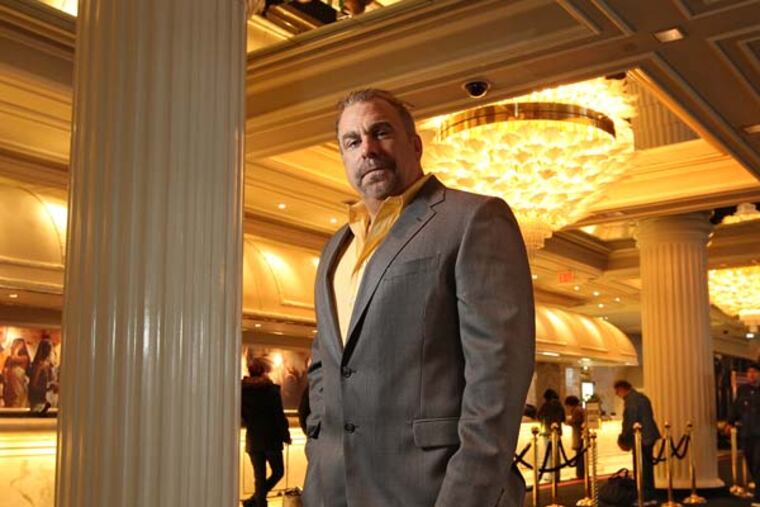Struggling casino awaits Christie decision on I-gaming bill
ATLANTIC CITY - A Feb. 7 deadline for Gov. Christie to sign off on a bill legalizing Internet gambling from computer servers based here is creating a sense of urgency at the Shore's smallest casino, the struggling Atlantic Club.

ATLANTIC CITY - A Feb. 7 deadline for Gov. Christie to sign off on a bill legalizing Internet gambling from computer servers based here is creating a sense of urgency at the Shore's smallest casino, the struggling Atlantic Club.
Its prospective buyer - Rational Group US Holdings, parent company of the websites PokerStars and Full Tilt Poker, which combined have tens of millions of worldwide subscribers - plans to establish a headquarters here, the first that would merge a land-based U.S. casino with an online-gaming company. But the purchase, for an undisclosed price and pending approval by New Jersey regulators, hinges on the I-gaming bill's becoming law.
As of late Thursday, Christie was still noncommittal.
"Nothing new to say before we act on the bill," said Michael Drewniak, Christie's spokesman.
Those involved in the negotiations said another Christie veto or inaction could torpedo the Atlantic Club deal and send Rational Group packing, leaving an uncertain fate for the casino and its 1,725 employees.
Longer term, gaming analysts said, it could turn other online-gaming companies away from investment-starved Atlantic City to states such as Nevada that have legalized intrastate online poker.
"We believe the future of gaming is to be able to provide a mix of online and off-line gaming, and our interest in Atlantic City is being able to offer that mix," Eric Hollreiser, spokesman for Rational Group, said in an interview Thursday from the Isle of Man, a British dependency in the Irish Sea where the company has its global headquarters. "The deal is based upon the vision."
In addition to basing its U.S. operation in Atlantic City, the company wants to develop a 10,000-square-foot data center filled with computer servers for online gaming, as well as set up a customer-support center in Jersey City, said Atlantic Club's Michael Frawley. He and co-chief operating officer Eric Matevich approached Rational Group three months ago, and a purchase deal came together in December.
Frawley said it would mean hundreds of millions of dollars of new capital investment for Atlantic City and 500 new jobs, in addition to saving the casino's current workforce.
Rational Group also plans to pump money immediately into refurbishing the casino, among the oldest here, Frawley said.
"We need Internet gaming," he said Wednesday at an Atlantic Club restaurant, adding that the "traditional model" of a brick-and-mortar casino no longer works here.
"We need a new model, one that combines the best of online technology with the traditional stuff," he said. "This could be the first of its kind anywhere."
Added Hollreiser: "Our investment is predicated on the environment, and if the environment is the status quo in Atlantic City, then the investment can only be so much. If we can fulfill the vision of online and off-line, clearly, the investment grows with it."
Legislation approved by overwhelming majorities in the state Assembly and Senate in late December would allow patrons to participate in online gambling from computer servers set up exclusively at Atlantic City casinos. The bill reached Christie's desk Dec. 20, giving him 45 business days to sign it, veto it, or let it die.
Last summer, Nevada became the first state to legalize intrastate online poker. In June, Delaware became the first to approve online casino gambling.
Internet-gaming proponents said that New Jersey was losing ground fast and that the struggling Shore casinos could generate an extra $200 million a year from online revenue. Under the approved legislation, gross online-gaming revenue would be taxed at 10 percent.
"While the governor's intention is unclear at this time," said gaming analyst Andrew Zarnett of Deutsche Bank, "in our opinion, should Internet gaming be legalized within the state, cannibalization of the brick-and-mortar casinos in Atlantic City is inevitable, as gaming patrons will choose the convenience of gambling at home rather than traveling to the casino."
In March 2011, Christie vetoed an online-gaming bill amid concerns the activity could not be restricted to the Shore casinos.
Some said Christie's hands may be tied politically. Las Vegas Sands Corp.'s chairman and chief executive, Sheldon Adelson, who adamantly opposes online gaming, gave upward of $25 million to Mitt Romney's failed presidential bid. Christie campaigned extensively for Romney.
On Thursday, Drewniak called that theory "positively specious."
"This is a serious public policy question," he said. "That's what's guiding the governor's decision, and that's it."
Atlantic Club, formerly ACH, formerly the A.C. Hilton, has had a particularly tough time competing against billion-dollar gambling palaces like Borgata and Revel and bruising rivals in Pennsylvania. It finished 10th among 12 casinos in total gaming revenue last year, generating $127.2 million, down 11.1 percent from 2011.
"I don't have shared services with other casinos in town or across the country," Frawley said. "I'm on my own."
at 215-854-2855 or sparmley@phillynews.com.